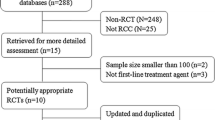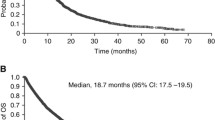Abstract
Background
The advance of medical treatment in renal cell carcinoma (RCC) has fostered the development of diverse continuous oral therapies with tyrosine kinase inhibitors (TKI), among these sunitinib remains the mainstay of therapy for most of the patients. Based on its clinical activity, disease control over a period of 11 months can be expected with sunitinib treatment. Given this prolonged period of exposure to sunitinib, adverse events tend to reoccur and can possibly decrease the quality of life in our patients. Hence, development of modalities to detect, treat and cope with such adverse events has become a major focus for physicians and patients. Today, numerous publications address these questions and offer advice from experienced centers. However, these reviews summarize single or oligo-center experiences.
Methods and Results
Our approach is based (1) on an extensive review and analysis of available evidence from literature and (2) a structured consensus survey among 12 German experts in the field who treated at least 30 patients each with a TKI.
Conclusions
Derived from this process, this paper gives an overview on Sunitinib therapy management recommendations deducted from published evidence and consensus agreement among experts.
Similar content being viewed by others
References
Motzer RJ, Hutson TE, Tomczak P, Michaelson MD, Bukowski RM, Oudard S, Negrier S, Szczylik C, Pili R, Bjarnason GA, Garcia-del-Muro X, Sosman JA, Solska E, Wilding G, Thompson JA, Kim ST, Chen I, Huang X, Figlin RA (2009) Overall survival and updated results for sunitinib compared with interferon alfa in patients with metastatic renal cell carcinoma. J Clin Oncol 27:3584–3590
Motzer RJ, Hutson TE, Tomczak P, Michaelson MD, Bukowski RM, Rixe O, Oudard S, Negrier S, Szczylik C, Kim ST, Chen I, Bycott PW, Baum CM, Figlin RA (2007) Sunitinib versus interferon alfa in metastatic renal-cell carcinoma. N Engl J Med 356:115–124
Hudes G, Carducci M, Tomczak P, Dutcher J, Figlin R, Kapoor A, Staroslawska E, Sosman J, McDermott D, Bodrogi I, Kovacevic Z, Lesovoy V, Schmidt-Wolf IG, Barbarash O, Gokmen E, O’Toole T, Lustgarten S, Moore L, Motzer RJ (2007) Temsirolimus, interferon alfa, or both for advanced renal-cell carcinoma. N Engl J Med 356:2271–2281
Grunwald V, Heinzer H, Fiedler W (2007) Managing side effects of angiogenesis inhibitors in renal cell carcinoma. Onkologie 30:519–524
Grunwald V, Soltau J, Ivanyi P, Rentschler J, Reuter C, Drevs J (2009) Molecular targeted therapies for solid tumors: management of side effects. Onkologie 32:129–138
Eskens FA, Verweij J (2006) The clinical toxicity profile of vascular endothelial growth factor (vegf) and vascular endothelial growth factor receptor (vegfr) targeting angiogenesis inhibitors; a review. Eur J Cancer 42:3127–3139
Schmidinger M, Zielinski CC, Vogl UM, Bojic A, Bojic M, Schukro C, Ruhsam M, Hejna M, Schmidinger H (2008) Cardiac toxicity of sunitinib and sorafenib in patients with metastatic renal cell carcinoma. J Clin Oncol 26:5204–5212
Speca J, Yenser S, Creel P, George D (2006) Improving outcomes with novel therapies for patients with newly diagnosed renal cell carcinoma. Clin Genitourin Cancer 5(Suppl 1):S24–S30
Azizi M, Chedid A, Oudard S (2008) Home blood-pressure monitoring in patients receiving sunitinib. N Engl J Med 358:95–97
Porta C, Paglino C, Imarisio I, Bonomi L (2007) Uncovering pandora’s vase: the growing problem of new toxicities from novel anticancer agents. The case of sorafenib and sunitinib. Clin Exp Med 7:127–134
Desai JG, Pavlakis H, McAarthur N, Davis ID GA (2007) Sunitinib malate in the treatment of renal cell carcinoma and gastrointestinal stromal tumor: Recommendations for patient management. Asia-Pacific Journal of Clinical Oncology 3:167–176
Bhargava P (2009) Vegf kinase inhibitors: How do they cause hypertension? Am J Physiol Regul Integr Comp Physiol 297:R1–R5
Chu TF, Rupnick MA, Kerkela R, Dallabrida SM, Zurakowski D, Nguyen L, Woulfe K, Pravda E, Cassiola F, Desai J, George S, Morgan JA, Harris DM, Ismail NS, Chen J-H, Schoen FJ, Van den Abbeele AD, Demetri GD, Force T, Chen MH (2007) Cardiotoxicity associated with tyrosine kinase inhibitor sunitinib. Lancet 370:2011–2019
Negrier S, Ravaud A (2007) Optimisation of sunitinib therapy in metastatic renal cell carcinoma: Adverse-event management. Eur J Cancer Suppl 5:12–19
Summary of product characteristics; sutent®
Di Lorenzo G, Autorino R, Bruni G, Cartenì G, Ricevuto E, Tudini M, Ficorella C, Romano C, Aieta M, Giordano A, Giuliano M, Gonnella A, De Nunzio C, Rizzo M, Montesarchio V, Ewer M, De Placido M (2009) Cardiovascular toxicity following sunitinib therapy in metastatic renal cell carcinoma: a multicenter analysis. Ann Oncol 20:1535–1542
Ivanyi P, Winkler T, Ganser A, Reuter C, Grunwald V (2008) Novel therapies in advanced renal cell carcinoma: Management of adverse events from sorafenib and sunitinib. Dtsch Arztebl Int 105:232–237
Izzedine H, Ederhy S, Goldwasser F, Soria JC, Milano G, Cohen A, Khayat D, Spano JP (2009) Management of hypertension in angiogenesis inhibitor-treated patients. Ann Oncol 20:807–815
Bhojani N, Jeldres C, Patard JJ, Perrotte P, Suardi N, Hutterer G, Patenaude F, Oudard S, Karakiewicz PI (2008) Toxicities associated with the administration of sorafenib, sunitinib, and temsirolimus and their management in patients with metastatic renal cell carcinoma. Eur Urol 53:917–930
National comprehensive cancer network21® (nccn). Clinical practice guidelines in oncology™. Cancer-related fatigue (v.2.2007). Available at: http://www.Nccn.Org/professionals/physician_gls/pdf/fatigue.Pdf, 2007
Wood L (2006) Managing the side effects of sorafenib and sunitinib. Community Oncol 3:558–562
Kollmannsberger C, Soulieres D, Wong R, Scalera A, Gaspo R, Bjarnason G (2007) Sunitinib therapy for metastatic renal cell carcinoma: Recommendations for management of side effects. Can Urol Assoc J 1:S41–S54
Staehler M, Haseke N, Schoppler G, Stadler T, Heinemann G, Stief CG (2006) managing the side effects of angiogenetic inhibitors in metastatic renal cell carcinoma. Urologe A 2006;45:1333–1342; quiz 1343
Houk BE, Bello C, Michaelson MD, Bukowski RM, Redman BG, Hudes GR, et al. (2007) Exposure-response of sunitinib in metastatic renal cell carcinoma (mrcc): A population pharmacokinetic/pharmacodynamic (pkpd) approach. J clin Oncol ASCO Meeting Abstracts 25 Abstract: 5027
Botchkareva NV, Khlgatian M, Longley BJ, Botchkarev VA, Gilchrest BA (2001) Scf/c-kit signaling is required for cyclic regeneration of the hair pigmentation unit. FASEB J 15:645–658
Rosenbaum SE, Wu S, Newman MA, West DP, Kuzel T, Lacouture ME (2008) Dermatological reactions to the multitargeted tyrosine kinase inhibitor sunitinib. Support Care Cancer 16:557–566
Webster-Gandy JD, How C, Harrold K (2007) Palmar-plantar erythrodysesthesia (ppe): a literature review with commentary on experience in a cancer centre. Eur J Oncol Nurs 11:238–246
Lacouture ME, Wu S, Robert C, Atkins MB, Kong HH, Guitart J, Garbe C, Hauschild A, Puzanov I, Alexandrescu DT, Anderson RT, Wood L, Dutcher JP (2008) Evolving strategies for the management of hand-foot skin reaction associated with the multitargeted kinase inhibitors sorafenib and sunitinib. Oncologist 13:1001–1011
Esper P, Gale D, Muehlbauer P (2007) What kind of rash is it?: Deciphering the dermatologic toxicities of biologic and targeted therapies. Clin J Oncol Nurs 11:659–666
Pfohler C (2008) US: Cutaneous reactions to molecular targeted therapies. Hautarzt 59:814–820
Acknowledgments
We appreciate the contribution of our colleagues, who participated in the survey: Dr. S. Al-Batran, Dr. J. Beck, Dr. S. Bierer, Prof. Dr. J. Casper, Dr. S. Feyerabend, Dr. R. Heuer, Dr. S. Machtens, Dr. E. Kettner, PD Dr. H. Kirchner, Prof. Dr. J. Roigas and Dr. L. Skrobek. This work was supported by a grant of Pfizer Oncology.
Author information
Authors and Affiliations
Corresponding author
Rights and permissions
About this article
Cite this article
Grünwald, V., Kalanovic, D. & Merseburger, A.S. Management of sunitinib-related adverse events: an evidence- and expert-based consensus approach. World J Urol 28, 343–351 (2010). https://doi.org/10.1007/s00345-010-0565-z
Received:
Accepted:
Published:
Issue Date:
DOI: https://doi.org/10.1007/s00345-010-0565-z




